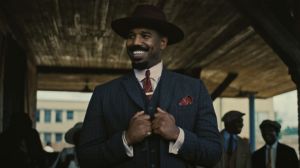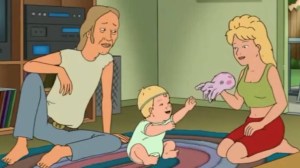To launch an all-new streaming platform, Quibi enlisted writer/director Veena Sud to develop a horror series, having previously worked on chilling programs like The Killing and The Lie. While other streaming services have a fairly traditional structure to their original programs, all Quibi offerings are told in chapters which are all less than 10 minutes and can exclusively be viewed on mobile devices. Additionally, the framing of each scene can be viewed either horizontally or vertically, posing new challenges for filmmakers. Luckily, Sud was more than up to the task, as she enlisted Maika Monroe (The Guest, It Follows) to bring her new series The Stranger to life.
Videos by ComicBook.com
In the series, an unassuming young rideshare driver (Monroe) is thrown into her worst nightmare when a mysterious Hollywood Hills passenger (Dane DeHaan) enters her car. Her terrifying, heart-stopping ride with the stranger unfolds over 12 hours as she navigates the seedy underbelly of Los Angeles in a chilling game of cat and mouse.
ComicBook.com recently caught up with Sud and Monroe to discuss the project, its unique challenges, and female characters in the horror genre.

ComicBook.com: Times are weird right now and we can all use any distraction from the real world we can get. What have you been watching during this global quarantine?
Maika Monroe: Where to begin? I like to try and pick a director and then watch a lot of their movies, and start from the beginning, and so I’ve been watching a lot of Todd Haynes movies. I just can’t believe that I’ve missed some of these movies before. They’re incredible. That’s been really fun. That’s been the most recent watch for me.
I saw that you recently posted something on Instagram about Eyes Wide Shut and I always appreciate people showing love for that film, since people often talk so much about other Stanley Kubrick films as being his best.
Oh, my God. He has to be my all-time favorite, I think. Isn’t there new a documentary out right now, right? Or, has that been out for a while? I don’t think I’ve seen it yet. Kubrick by Kubrick or something? I don’t know why it’s been brought to my attention only recently.
Right, I think between the festival circuit and limited releases and VOD releases, it’s hard to keep track of what movies are out there and what you’re actually able to watch vs. what others are watching.
Yeah, I need that (movie). Well, are we able to watch this or no?
Maybe we should just hang up and both watch it and compare notes later?
Yeah. I will talk to you later. Perfect.
Well as we try to figure out when we can see Kubrick by Kubrick, we can talk about The Stranger. How did you first get involved with the project?
I was sent the script and sent information on the director, and I was already a huge fan of Veena. The Killing and Seven Seconds were really, really incredible. I think maybe a couple days after reading the script, I met with Veena. She’s awesome. I just loved all her ideas. Since this is a new platform, you can’t just make a typical series or a typical movie. It’s brand new, and she had so many cool ideas on how to make this series work. That’s how it began.
And coming from the Kubrick topic, being regarded as one of the best directors in history, was there apprehension about telling this story in a way that’s so different from the cinematic experience?
Veena Sud: It’s a great question, because when I first went in to meet with (Quibi creator) Jeffrey (Katzenberg), not only did I have apprehensions about doing anything on a small screen, but I had no idea, really, what they were talking about at first until I sat down with him and heard it straight from him. The excitement, I think, for me around this new platform is that it offers a completely, potentially — and I think we’re just scratching the surface with getting work on this platform — a way to recalibrate how we see storytelling with a device that is so interactive.
What I mean by that is, I love the theatrical experience. I love the big TV experience. I love all those experiences, but I know every single human being in the world pretty much has a relationship with their phones, these tiny devices we hold in our hands, and a universal language around it, which is pretty exciting.
Every single human being in the world, almost, has the same gut reaction to that text tone, and the fact that we share that is the beginning of maybe a really exciting way to tell stories differently than we have before. That’s what drew me to it. I’m an old school snob. I love the theatrical experience. I would never want to live in a world without that.
This might sound strange, but I remember first seeing trailers for The Emoji Movie and having this weird thrill at a vertical phone screen being projected on that massive theater screen and thinking the whole movie would use that framing.
Monroe: The Emoji Movie. Amazing.
That’s probably the first time The Emoji Movie has come up in an interview for The Stranger, but my point is that, while watching your show, I couldn’t stop rotating my phone to see how the framing changed during each scene. How did the framing constraints change how you actually shot the show?
Sud: It 100% affected us, because we had to think, baseline, we had to be like, “The vertical format is just going to give us less east/west information, so what does that mean?” Beyond having to think of the frame on the set and making sure we weren’t mushing somebody on the very edge of frame. The bigger question then became, for me and the (director of photography), Paul Yee, we were thinking, “How do we make sure that this experience… what if somebody were to just hold the phone in their hand in a vertical way?” I want them to have a full, lush experience of the story.
In order for that to happen, I had to, like, do a little tabula rasa in my brain in terms of thinking east, west. We have two eyeballs, so we see in that aspect ratio, the horizontal aspect ratio, but we can’t do that with the vertical, so instead of thinking east, west, we started to think A to Z. A means me and Z means the deepest focus point in the frame.
That’s why the character of Clare is moving, why there’s tons of camera lead and follow. It was so exhausting. We were shooting all night, and poor Maika had to run double time, with a camera in front and camera behind and it was just crazy, but we were really thinking in terms of depth. Then, Maika having to run longer, because usually an actor will run from a certain point, and then you can drop the shot, but we couldn’t, because we had to constantly think about how deep we can go in this frame to make the audience feel like they’re not getting less information, they’re getting as much, if not more, than they would on a horizontal screen, if that makes any sense.
It does. And for Maika, was the shooting experience any different for you or did you approach the project the same way as everything else you’ve done in regards to that framing?
Monroe: I would say it overall felt very similar to any other project. The only thing with this was what Veena was just saying, that there were a lot of shots moving, and for some scenes, there were a lot of setups, and so I, as an actor, had to be prepared to be doing a very intense scene several times. It can be challenging, but it’s what’s so brilliant about Veena and the DP making this show work for a platform like Quibi.
And with this being a new platform and a new medium, to some degree, what did you discover about the strengths of telling a story in this way?
Sud: I think, again, we’re just scratching the surface, and I think the fact of the matter is that what this format does is challenge the way we’ve traditionally seen things, the same way television changed the way we look at content from cinema back in the day, with that advent of television. They had to do more dramas, because they couldn’t compete with the spectacle of cinema.
I feel like the first lesson for me, at least, as a filmmaker, was the depth lesson. The second, were I able to do another series and to continue on this format, would be using the language that is emerging already from phones and weaving a tapestry of stories with that. The most simplistic thing, as an example, is how we use TikTok, how we use FaceTime, how we use the cameras inside the phones already to communicate in a way that feels fresh and new and not a retread of stuff that’s been done before.
It just feels like the Wild West, kind of. Like there’s so many different ways that we’re using the phone, especially now. There are endless possibilities. The question is who can think of the next, the new kind of language that’ll be exciting and fun to watch.
Which is a good point, because whether you are viewing a Quibi series or something on TikTok or a YouTube video, the playing field can be leveled and there’s less distinction about “professional” content when it’s all on your phone.
Sud: I was just going to say, too, the format, the traditional three-act structure or episodic structure, the way we tell stories, could then also maybe morph a little bit because of the new language of the phone. Is there the multi-chapter TikTok series where nothing is really related except by a theme? How this will affect the actual story is another exciting possibility to think about.
Not only is Maika’s Clare a badass in The Stranger, making plenty of smart decisions, but Dane’s character even points out various horror tropes about the stereotypical “Final Girl” or “Scream Queen” mold. Maika, when The Guest and It Follows were both released in the same year, people pegged you as the next big Scream Queen and I wondered what your thoughts were on that, if it felt empowering to be called that or if it felt reductive and limiting?
Monroe: Go ahead, Veena. I’m curious what you say.
Sud: I’m so curious, too, about your thoughts. First off, Maika Monroe is truly… like, this woman is one of the top actresses I’ve ever had the opportunity to work with. Everything that she does comes from such a place of depth, and I think when I was first thinking of Clare and first thinking about the genre, and the genre that I actually really enjoy and love, my one huge caveat around the genre is there is such a sexualization of the woman, the damsel in distress, in this genre historically.
Maika’s work in It Follows and in The Stranger, what she does is she lets every woman who’s watching this and, I think, every man and everybody, feel the depth, the true depth of terror and horror that anybody in these situations would actually feel. There is an honesty and a truth to what Clare is going through that is not sensationalized and certainly not sexualized.
I feel that, to then take something that we traditionally associate with — and, I also want to say that I think “yay” for the horror genre that it is changing and challenging these old tropes of damsel in distress — but Maika is the woman to do it, because she really inhabits that space that allows us to have complete empathy. The thing I hear over and over and over from so many people who watch this show is “terrified” because they 100% relate to her.
Then, this feeling of empowerment and “f-ck this mother f-cker,” and “I’m going to get him back,” and “there’s no way that he’s going to win this battle” and pulling from that strength. I think the only reason that works is because the actress actually inhabits that. Hats off to Maika. It’s not easy, to upend tropes in a genre that’s so entrenched in our society, is not an easy thing, and she does it.
Monroe: Thank you so much.
Sud: A lesser actress, I would be worried about, because it skates on such a fine line.
Monroe: It’s so true. It’s been a crazy ride. Being a part of It Follows, which, there’s so many movies that have changed the horror genre, but I know that It Follows is such a massive influence and this change of the genre, which was so cool to be a part of, and so many people really connected with that film.
Like Veena said, for me, with these projects, all I can do is give the most honest performance and, to me, I don’t look at it necessarily as a horror film or thriller or this or that. It’s just me really falling into this character and bringing as much truth as I can so that people can really fall into the story.
I know some actresses get frustrated when they earn that label, as it might limit what characters they are seen as, but others are proud to wear that label alongside other famous horror actresses.
Monroe: I mean, I don’t know. I don’t know actually how to answer that question, really.
Neither do I, so we’re in the same boat.
Sud: I think the genre is so, as we’re seeing now, it’s so subversive. It gets to say all sorts of stuff about race and gender that, in a more “straightforward” genre, maybe people wouldn’t be as open to. Again, I think so much of the success of this type of genre upending really depends on the actors behind it who are inhabiting the people.
Lastly, on the subject of It Follows, fans have hoped to get a sequel for years and have come up with titles like “They Follow” or “She Follows” for what we could see in a sequel. Has there been any talk about a sequel or is that something you’d be interested in?
Monroe: I would absolutely love to work with (writer/director) David (Robert Mitchell) again. That would be a dream, but, you know, we’ll just have to wait and see.
That was a very diplomatic and vague answer.
Monroe: Yes.
Well I look forward to more episodes of The Stranger where we learn it was this big sci-fi story, since I don’t know how else someone who just moved to L.A. could have an apartment as big as Clare’s, so it’s gotta be a spaceship or something and she is from another planet.
Monroe: Perfect. You got to tune in and see.
And she takes Dane’s character back to her home planet and it’s the planet where all the It Follows monsters live.
Monroe: There we go. I love it. We’ve got it all.
*****
The Stranger is now available on Quibi.









